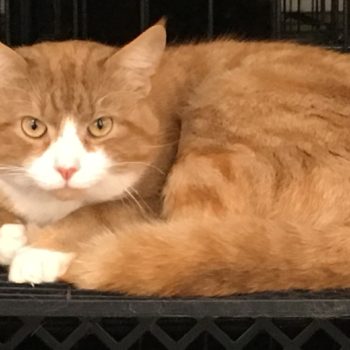When hundreds of cats in the New York City Animal Care and Control shelters tested positive for avian influenza last year, everyone involved set their only goal — saving the cats’ lives. That was a goal they reached, thanks to shelter medicine and the power of collaboration.
“The NYACC did not want to euthanize a single cat,” said Dr. Laurie Peek, Maddie’s Fund Executive Leadership Team. “They were committed to finding a lifesaving response to this outbreak. Knowing this was an overwhelming problem, they were quick to reach out for help. They trusted the community to come through.”
And come through it did, with an army of volunteers and a historic collaboration between Maddie’s Fund®, the ASPCA, the University of Wisconsin Shelter Medicine Program, New York City Animal Care and Control, the New York City Department of Health, the Centers for Disease Control, the Wisconsin Veterinary Diagnostic Laboratory, and more. That effort, and the lessons learned, will be the subject of an April 6 Maddie’s Fund webcast, What You Need to Know about the New York City Feline Influenza Outbreak, presented by UW Shelter Medicine Director Dr. Sandra Newbury.
Maddie’s Fund is one of the benefactors of the UW shelter medicine program, along with Margaret A. Cargill Philanthropies. After being contacted by NYACC about the sick cats, Dr. Newbury worked with Maddie’s Fund to obtain support for diagnostic testing for the shelter’s cats — assistance Maddie’s Fund was quick to give, committing up to a million dollars toward the effort to save the cats. Dr. Peek also went to New York City to participate in planning, and later to visit the quarantine center once it was established in a leased warehouse.
The effort would not have been successful without the backbone of support provided by the ASPCA, which is located in New York City and had taken some of the influenza-infected cats from NYACC into their own shelter.”The ASPCA field disaster response team was incredible,” said Mary Ippoliti-Smith, Maddie’s Executive Leadership Team.
“The ASPCA had the first shelter veterinarian in the country, Dr. Lila Miller,” said Dr. Peek. “And we funded the country’s first shelter medicine residency, Dr. Kate Hurley at U.C. Davis. We’ve been funding lifesaving with New York City rescue groups and shelters for many years, and the ASPCA is highly engaged in the community as well. So it’s very meaningful that we worked together to establish protocols and procedures designed to save lives during this outbreak.”
At the helm of the outbreak response was Dr. Newbury, providing shelter medicine protocols that were implemented by a huge flood of veterinary students, residents and interns who answered the call for help from veterinary school shelter medicine programs across the country.
“I’m very proud Maddie’s Fund has supported the training of the veterinary students, interns and residents who were invited from shelter medicine programs,” said Dr. Peek. “Even though this happened over the holidays, they volunteered to manage all the medical protocols instituted by Dr. Newbury.”
The protocols worked. Only a very small number of cats died during the outbreak, while hundreds of infected cats survived.
Maddie’s Fund has invested nearly $20 million into shelter medicine education and research as part of its mission to create a no-kill nation where every dog and cat is guaranteed a healthy home or habitat. “Our investment in shelter medicine was made so our field as a whole could have knowledge so every shelter can handle a situation like this,” said Dr. Peek. “But it’s really part of a larger picture, where we focus less on responding to outbreak disasters, and more on preventing them by using the principles of shelter medicine, including addressing the negative impacts of confinement.”
Ippoliti-Smith agreed. “Sheltering equals confinement, confinement equals stress, stress equals disease outbreaks,” she said.
The goal of any outbreak disaster response should be to learn as much as possible about regularizing processes so future outbreaks can be prevented, or responded to more rapidly. That’s why, out of the experience of the outbreak, Maddie’s Fund is putting together an advisory group of shelter medicine experts to lay the groundwork for a national shelter outbreak response center. It will be a collaborative group drawing on nationwide experience to create a support system available to every shelter facing an outbreak.
“We would love to be able to have an outcome from all of this, that there would be a go-to place where people can see if there’s something happening, where they can log in or make a call and find out what actions they can take and not have to depopulate,” said Dr. Peek. “That’s why we do this. We don’t want to see the animals killed.”
Organizations and individuals who are interested in the outcome of these efforts can sign up for the Maddie Network to receive updates and reports.
“If you really want to help, foster,” said Smith. “Get the animals out of confinement.”
On Thursday, April 6, at 3 PM Eastern, Dr. Sandra Newbury and Maddie’s Fund will present a free webcast on the outbreak, covering its history as well as important prevention and diagnostic information for shelters. More information and a registration link are at What You Need to Know about the New York City Feline Influenza Outbreak.

